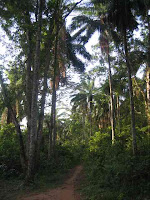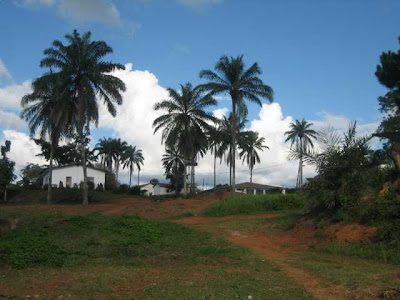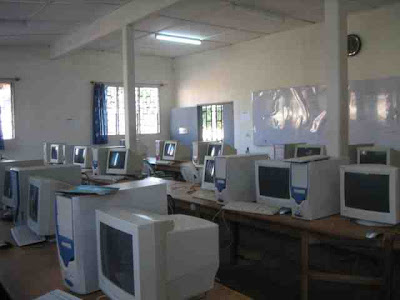As a government agency, Peace Corps uses a lot of acronyms. One of which is COS: Close of Service. This is the acronym for when a volunteer is about to finish their service and all the paperwork, medical exams, etc that go with it. Once a volunteer has finshed this process, they are said to have "COS'ed" and become RPCVs (Returned Peace Corps Volunteers).
COS is preceeded about two to three months before a volunteer's scheduled departure date with a "COS conference" held at a nice hotel in Yaoundé. All volunteers from the same training group, who came in together and will leave about the same time, gather at the hotel for three days of seminars, paperwork, language tests, interviews, and other sessions in order to prepare for COS.
COS conference is usually a pretty nostalgic event, and ours was no exception. It was good to be back together with everyone from my "stage" (training group), some of whom I don't think I'd seen since training two years ago. The formal sessions were predictably long and boring. A session on job hunting by someone from the US embassy's HR department was particularly painful. Fortunately we ended up with a fair amount of free time to hang out in the hotel bar, at the hotel pool, during meal and coffee breaks, and in each other's rooms in the evenings. After the conference a few of us took a trip to Limbé to enjoy the beach one last time before the end of our service.
It was interesting to take stock of how we made out during our service. Some didn't make it: out of 46 of us who stepped off the plane in June, 2006, 31 remained by April, 2008. Some people had an overwhelmingly positive experience, others less so. Most were glad they had done it and knew they would miss their friends, but were also ready to go home.
A few however, were not quite ready to go home. Peace Corps is normally a two year assignment, but in most countries they offer a limited number of third year extensions. COS conference is the time when volunteers apply for these positions. Several people from our group sought and received extensions to work on various projects. One guy is staying in his village a third year, the rest are moving to different jobs and towns in Cameroon.
Two years in Nanga-Eboko has been a good (although often frustrating) experience, but I'm ready to blow this town. However, after a lot of thought and a lot of talking to friends and family in the months before COS conference, I decided that while I was ready to leave Nanga, I was not ready to leave Cameroon yet and applied for a third year position. The last two years flew by and I still feel I have a lot to learn and see here.
During training last year one of Peace Corps' staffers approached me to suggest I consider extending my service for a third year in a different post. Up to that point a third year had not occurred to me, but his suggestion did get me thinking and decided that if I was having a good experience here why not stay a little longer? So, not long after I started talking to Peace Corps administration to see what kind of assignments might be possible if I were to stay.
I did decide, however, that I would not stay in Nanga. I've learned a lot here and made some great friends, but I feel two years here has been enough. If I was going to stay I wanted a different experience. So, after a lot of discussions Peace Corps offered me a great third year assignment in a new post and new job which I decided to accept.
For my third year I will be working as a small enterprise development volunteer in the town of Buea. I've written about
Buea before. It's a great place: paved roads, decent utilities, nice people, good food, English-speaking (kind of - I'll have to learn some Pidgin), and only 30 minutes from the beach at
Limbe. It also helps that
Bill, one of my closest friends from Peace Corps who is posted in Buea is also sticking around, so we'll both be in the same town.
As an added bonus, internet service is good in Buea and there are lots of cyber cafes, so I may actually be able to email people and update this blog more often! I've accumulated a huge backlog of stories and pictures I've been wanting to post but haven't done so because of the difficulties of getting online regularly.
Work wise, in my new assignment I will be working with a couple of NGOs in Buea training their staffs in computer literacy, helping with strategic planning, and helping them organize various small business development activities like community business classes and micro finance projects. In contrast to working as a teacher, where volunteers are stuck with their institutions, as a SED volunteer I will be free to pursue whatever projects in the community I want. I think this will give me a lot more flexibility and room for creativity than I have in my current position.
With a new job, a new town, and with good friends and the beach close at hand, I think I will have a great third year and I'm excited to get started. I will be moving to Buea in June and will be in Cameroon most of the summer in order to do some retraining for the new job and get started with work. I'll be coming home for 30 days in August and September on leave, so I will see family and friends then.
I want to thank all of you for the support and encouragement you have given me the last two years. I couldn't have done it and I couldn't stay a third year without knowing my friends and family were behind me.






























